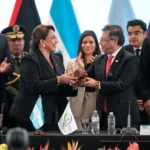Energy News Beat
Members of the Community of Latin American and Caribbean States critiqued tariffs and strategized about the future of the United Nations.
CELAC Summit Yields ‘Sufficient Consensus’
On Wednesday, the Community of Latin American and Caribbean States (CELAC) held its annual leaders’ summit in Tegucigalpa, Honduras. The meeting took the temperature of regional relations at a tense moment in global politics.
Thirty of CELAC’s 33 member countries signed the summit’s final declaration, which included a veiled critique of U.S. President Donald Trump’s tariff policy. The leaders said that they rejected “unilateral coercive measures,” including “those that restrict international trade.”
Argentina, Paraguay, and Nicaragua abstained from the joint statement. The former two countries are run by conservative leaders who have sought close relations with Trump, while Nicaragua is led by an insular authoritarian government with leftist roots.
CELAC heads of state wrote that their declaration still achieved “sufficient consensus” despite the three abstentions. Colombian President Gustavo Petro took over CELAC’s rotating presidency on Wednesday and said that the group would hold meetings this year with the European Union, the Gulf Cooperation Council, the African Union, and China.
On the diplomatic front, the declaration argued that the next United Nations secretary-general should hail from Latin America and the Caribbean. The leaders noted that a woman has never held the position. Under an informal norm at the U.N., the secretary-general position generally rotates between different regions. Secretary-General António Guterres is from Portugal, and his term is set to end in December 2026. After Europe, Latin America and the Caribbean will be up next.
Brazil is among the countries trying to rally its neighbors around the idea of a female consensus candidate for secretary-general, without specifying who it would be. “We will negotiate” on the matter, Brazilian diplomat Gisela Padovan said last week. Names floated for the role include Barbados Prime Minister Mia Mottley, former Chilean President Michelle Bachelet, and former Costa Rican Vice President Rebeca Grynspan.
One of the biggest changes from last year’s CELAC summit is that Mexico’s president was in attendance. Former Mexican President Andrés Manuel López Obrador traveled little outside the country during his tenure and generally did not prioritize growing Mexico’s regional economic ties.
But President Claudia Sheinbaum, who took office last October, has taken a different tack. In Tegucigalpa on Wednesday, she announced plans to organize a “summit for the economic well-being of Latin America and the Caribbean” at an unspecific future time and place.
Despite the ambitions of unity voiced at the CELAC summit, the region is far from developing a unified response to one of its biggest challenges: Trump. When it comes to U.S. deportation requests, trade restrictions, or even the threat of territorial takeover, Latin American countries have mostly approached diplomacy with the United States bilaterally rather than as a bloc.
After Trump repeatedly vowed to “take back” the Panama Canal and criticized Chinese activity in the waterway, Panama audited the Hong Kong-based owner of two ports—and the firm quickly announced a deal to sell them. While that sale has faced delays, U.S. Defense Secretary Pete Hegseth praised Panama’s security cooperation with the United States this week in a de-escalation from Trump’s rhetoric.
On deportations, receiving Latin American countries have sought to negotiate directly with the United States. In a recent case of sweeping and rushed deportations, U.S. authorities sent dozens of men with no U.S. criminal records to a Salvadoran prison last month before they had a chance at legal defense. The U.S. justice system has been more vocal in contesting these abuses than most Latin American countries—perhaps because they fear retaliation from the White House.
If there is a joint Latin American response to Trump’s threats in the works, this week’s CELAC summit was more of a warmup than a definitive play.
Upcoming Events
Sunday, April 13: Ecuador holds a presidential runoff election.
Monday, April 14: Trump hosts Salvadoran President Nayib Bukele at the White House.
Monday, April 14: U.S. Treasury Secretary Scott Bessent travels to Argentina.
What We’re Following
Mexico’s judicial election. Campaigning has begun for Mexico’s first-ever national judicial election on June 1. The undertaking is controversial in part because of its scope. More than 4,000 candidates are running for more than 800 federal positions, including on the Supreme Court.
Though judges are elected in some countries and U.S. states, they are generally not chosen all at once. And because most voters are not used to making choices about their judges, legal experts have cautioned that Mexico’s largest political parties could be highly influential in shaping opinion.
There are also concerns about the type of election-related violence that is common in Mexico. Drug gangs were the suspected actors behind many political assassinations during the country’s general election last year.
Disaster in the DR. The Dominican Republic declared three days of national mourning after 221 people died when the roof of a Santo Domingo nightclub collapsed early Tuesday morning. The tragedy unfolded during a merengue concert. Among those killed were a lawmaker, a governor, and two former U.S. Major League Baseball players.
Authorities are still working to determine the exact cause of the collapse. The building was a movie theater before it became a nightclub, and its Monday night concerts were legendary. This week featured merengue star Rubby Pérez, who died in the disaster. His career stretched over four decades, and he was known for hits such as “Buscando Tus Besos.”
 Fans of Ecuadorian soccer club Mushuc Runa cheer for their team during a Copa Sudamericana group stage match in Belo Horizonte, Brazil, on April 9.
Fans of Ecuadorian soccer club Mushuc Runa cheer for their team during a Copa Sudamericana group stage match in Belo Horizonte, Brazil, on April 9.
Fans of Ecuadorian soccer club Mushuc Runa cheer for their team during a Copa Sudamericana group stage match in Belo Horizonte, Brazil, on April 9.Douglas Magno/AFP via Getty Images
Flight of the poncho. Ecuador’s soccer team Mushuc Runa—which in the Indigenous Kichwa language means “New Man”—has advanced further than ever before in the South American Cup, a regional club tournament.
The team is known as the “Little Poncho” for the red ponchos that are typical attire for many Indigenous Ecuadorians. It was founded in 2003 by a banking cooperative that aimed to encourage Indigenous participation in different sectors of society. Today, the team’s roster has expanded to include players from different countries.
Mushuc Runa’s first matchup in the group stage was another club steeped in local history: Chile’s Palestino, founded by members of the Palestinian diaspora. The Little Poncho beat Palestino 3-2 last Thursday, then went on to beat Brazilian team and former South American champion Cruzeiro 2-1 on Wednesday.
“It’s historic,” Mushuc Runa’s president said of the tournament.
The post Latin American Leaders Gather in Honduras appeared first on Energy News Beat.









